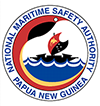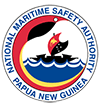NMSA warns of unsafe boating practises - Papua New Guinea National Maritime Safety Authority

MEDIA RELEASE
NMSA warns of unsafe boating practises
15th January 2018
The National Maritime Safety Authority (NMSA) has cautioned small boat owners, operators and passengers in the Maritime Provinces to exercise some responsibility and comply with sea safety measures.
These include not overloading, carrying extra fuel, not travelling in bad weather and ensuring that the boat operators and passengers are not drinking alcohol.
NMSA General Manager/Chief Executive Officer, Paul Unas issued this warning after a tragic
boating incident in Wewak, East Sepik Province which saw seven passengers missing with only one survivor.
NMSA Maritime Rescue Coordination Centre (MRCC) had received report of the incident involving the dinghy ferrying 8 passengers from Vanimo, capsized between Robin Island and Mushu Island.
The sea voyage took place on Tuesday 9 January 2018 between 1300hrs and 1400hrs.
One of the male survivor, managed to swim ashore whilst seven passengers still missing.
From reports received by MRCC, it was confirmed that the skipper was under the influence during the voyage. It is also confirmed that seven passengers are still missing out at sea.
NMSA reminds governments of the 15 maritime provinces of their responsibility to ensure a high level maritime safety is enforced on people who rely on the sea for their livelihood and sustenance.
These provinces must take full responsibility and ownership to ensure the Small Craft Act (SCA) 2011 is effectively implemented and administered to improve and promote sea safety for small boat owners, operators and passengers, especially those who use the sea as their main way of transportation.
Mr Unas said: “The maritime provinces have that responsibility under law and for practical purposes. NMSA has a field presence in only six locations outside Port Moresby and therefore is not in a position to implement and enforce the small craft act nationally.”
He said each maritime province has different circumstances and needs that require local solutions. Therefore, it is appropriate and right that it is the Maritime Provinces that tailor maritime safety and regulation solutions that are best suited for their communities and waters.
Mr Unas said: “No matter what laws and standards are put in place, people will continue to be lost at sea if dinghies continue to be overloaded, run out of fuel, travel in bad weather, consumption of alcohol by boat operators or passengers, etc. These bad decisions that directly cause loss of life at sea are not made by remote government officials, but by the operators of the dinghies and the passengers who decide to travel with them.
He further reiterated that failure to comply with sea safety measures can result in severe penalties under the Small Craft Act.
He said: “These apply to all operators and passengers. If anyone is caught breaching this Act, necessary penalties will be applied accordingly.”
Mr Unas encouraged everyone in the Maritime Provinces to embrace maritime safety and practise sea safety before anything else when going out to sea especially during this windy period.

